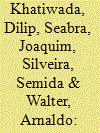|
|
|
Sort Order |
|
|
|
Items / Page
|
|
|
|
|
|
|
| Srl | Item |
| 1 |
ID:
114322


|
|
|
|
|
| Publication |
2012.
|
| Summary/Abstract |
This study discusses four European and American regulatory schemes designed for accounting lifecycle GHG emissions in relation to the Brazilian sugarcane ethanol. The objective is to critically examine the methodologies and associated parameters used in existing regulatory schemes for calculating GHG emissions, and to explore methodological convergences. The issues related to direct lifecycle and indirect land use change emissions have been addressed. It is found that there are commonalities between the European Renewable Energy Directive (EU-RED) and the UK's Renewable Transport Fuels Obligation (UK-RTFO), but the US-EPA's Renewable Fuel Standard (US-EPA) and the Low Carbon Fuel Standard of the California Air Resources Board (CA-CARB) vary greatly not only among themselves, but also in relation to the European regulations. Agricultural practices (especially soil carbon and nitrogen dynamics), co-product credits from surplus electricity and uncertainties around economic modeling approaches for indirect land use change are the major areas where methodological divergences exist. Incorporation of domestic agricultural practices, sugarcane mills operations, and realistic modeling of indirect impacts of land use change using regional models could provide more coherence in estimations of GHG emissions. Furthermore, the Brazilian trend of novelty in all phases of sugarcane bioenergy systems should be considered when projecting GHG emissions.
|
|
|
|
|
|
|
|
|
|
|
|
|
|
|
|
| 2 |
ID:
109600


|
|
|
|
|
| Publication |
2011.
|
| Summary/Abstract |
Three sustainability aspects of bioethanol production in Brazil were considered in this paper. Results show that the recent expansion of sugarcane has mostly occurred at the expense of pasturelands and other temporary crops, and that the hypothesis of induced deforestation is not confirmed. Avoided greenhouse gas emissions due to the use of anhydrous ethanol blended with gasoline in Brazil (E25) were estimated as 78%, while this figure would be 70% in case of its use in Europe (E10). Conversely, considering the direct impacts of land use change, the avoided emissions (e.g., ethanol consumed in Europe) would vary from -2.2% (i.e., emissions slightly higher than gasoline) to 164.8% (a remarkable carbon capture effect) depending on the management practices employed previous to land use change and also along sugarcane cropping. In addition, it was shown that where the bulk of sugarcane production takes place, in state of São Paulo, positive socio-economic aspects are observed. The general conclusion is that a significant share of ethanol production in Brazil can be considered sustainable, in particular regarding the three aspects assessed. However, as production conditions are extremely heterogeneous, a generalization of results is not possible.
|
|
|
|
|
|
|
|
|
|
|
|
|
|
|
|
|
|
|
|
|